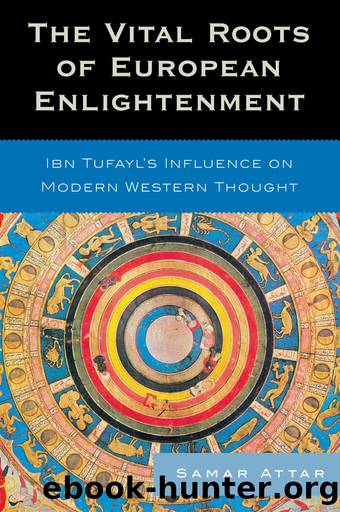The Vital Roots of European Enlightenment by Attar Samar;

Author:Attar, Samar; [ATTAR, SAMAR]
Language: eng
Format: epub
ISBN: 500766
Publisher: Lexington Books
NOTES
1. This article has first appeared in Adventures of Identity: European Multicultural Experiences and Perspectives, eds. John Docker & Gerhard Fischer (Tübingen: Stauffenburg Verlag), 75–89.
2. Aristotle, “Politics,” in Richard McKeon, ed. The Basic Works of Aristotle (1941; New York: Random House, 1966), 1130.
3. Cf. Madani Salih, Ibn Tufayl: Qadaya wa-Mawaqif, 2nd ed. (Baghdad: Wizarat al-Thaqafa, 1986), 13–14. Salih uses the account of Ibn al-Abbar, a contemporary of Ibn Tufayl, who mentions that the Andalusian philosopher was born near Wadi Ash in Barshana, a fortified town.
4. For the life and works of Ibn Tufayl, consult The Encyclopaedia of Islam 1927, vol. ii, 424–25; L. Gauthier, Ibn Thoifail, sa vie, ses oeuvres (Paris, 1909); Al-Bustani, Da’irat al-Ma’arif, vol. iii (Beirut, 1960), 299–307.
5. For the various translations of Hayy see the Encyclopaedia of Islam, New Edition, vol. iii, 330–34. I have consulted the Arabic versions of Dar al-Mashriq, ed. A. N. Nadir (Beirut, 1968); Dar al-Afaq, ed. F. Sa’d (Beirut, 1980); the 5th edition published by Damascus University, ed. J. Saliba and K. ‘Ayyad (Damascus, 1962), and the English translations of L. E. Goodman, Ibn Tufayl’s Hayy Ibn Yaqzan (New York: Twayne Publishers, 1972) and R. Kocache’s The Journey of the Soul: The Story of Hai bin Yaqzan (London: The Octagon Press, 1982). All subsequent references to Hayy Ibn Yaqzan are from Kocache’s translation; page number will be cited in the text in parenthesis.
6. See my article “Serving God or Mammon? Echoes from Hayy Ibn Yaqzan and Sinbad the Sailor in Robinson Crusoe,” in Lieve Spaas and Brian Stimpson, eds. Robinson Crusoe: Myths and Metamorphoses, ed. Lieve Spaas and Brian Stimpson (London, New York: Macmillan Press & St. Martin’s Press, 1996), 78–97. For more details on the life of Yusuf, Ibn Tufayl’s patron, consult Ibn Khallikan’s Wafiyat al-A’yan wa-Anba’Abna’al-Zaman, ed. Ihsan ‘Abbas (Beirut: Dar al-Thaqafa, n.d.), 130–38.
7. See my article “The Man of Reason: Hayy Ibn Yaqzan and His Impact on Modern European Thought,” in Qurtuba estudios andalusies 2 (Cordoba 1997): 19–47.
8. For the ethnic and religious composition of Muslim Spain see Pierre Guichard, “The Social History of Muslim Spain from the Conquest to the End of the Almohad Regime (Early Second/Eighth–Early Seventhh/Thirteenth Centuries),” 697–723, and Mahmoud Makki, “The Political History Of Al-Andalus 92/711–897/1492,” 3–87 in Salma Khadra Jayyusi, ed. The Legacy of Muslim Spain, (Leiden: Brill, 1992). Cf. also Thomas F. Glick, “Ethnic Relations,” in Islamic and Christian Spain in the Early Middle Ages (Princeton: Princeton University Press, 1979), 165–93.
9. For more details on the political history of Muslim Spain, see Philip Hitti. History of the Arabs, 10th ed. (London, New York: Macmillan & St. Martin’s Press, 1970), 493–556. Cf. also Anwar G. Chejne, Muslim Spain: Its History and Culture (Minneapolis: The University of Minnesota Press, 1974), 3–109.
10. See Hitti, History of the Arabs, 526–27.
11. See Hrotsvitha in Scriptores rerum Germanicarum; Hrotsvithoe opera, ed. Paulus de Winterfeld (Berlin, 1902), 52, l. 12. Quoted by Hitti, History of the Arabs, 527.
12. Quoted by Hitti, History of the Arabs, 531. Cf. Lévi-Provencal (ed.), Histoire des Musulmans, vol.
Download
This site does not store any files on its server. We only index and link to content provided by other sites. Please contact the content providers to delete copyright contents if any and email us, we'll remove relevant links or contents immediately.
What's Done in Darkness by Kayla Perrin(25501)
Shot Through the Heart: DI Grace Fisher 2 by Isabelle Grey(18220)
Shot Through the Heart by Mercy Celeste(18160)
The Fifty Shades Trilogy & Grey by E L James(17777)
The 3rd Cycle of the Betrayed Series Collection: Extremely Controversial Historical Thrillers (Betrayed Series Boxed set) by McCray Carolyn(13189)
The Subtle Art of Not Giving a F*ck by Mark Manson(12913)
Scorched Earth by Nick Kyme(11833)
Stepbrother Stories 2 - 21 Taboo Story Collection (Brother Sister Stepbrother Stepsister Taboo Pseudo Incest Family Virgin Creampie Pregnant Forced Pregnancy Breeding) by Roxi Harding(11040)
Drei Generationen auf dem Jakobsweg by Stein Pia(10217)
Suna by Ziefle Pia(10186)
Scythe by Neal Shusterman(9263)
International Relations from the Global South; Worlds of Difference; First Edition by Arlene B. Tickner & Karen Smith(8609)
Successful Proposal Strategies for Small Businesses: Using Knowledge Management ot Win Govenment, Private Sector, and International Contracts 3rd Edition by Robert Frey(8419)
This is Going to Hurt by Adam Kay(7696)
Dirty Filthy Fix: A Fixed Trilogy Novella by Laurelin Paige(6453)
He Loves Me...KNOT by RC Boldt(5805)
How to Make Love to a Negro Without Getting Tired by Dany LaFerrière(5378)
Interdimensional Brothel by F4U(5305)
Thankful For Her by Alexa Riley(5162)
